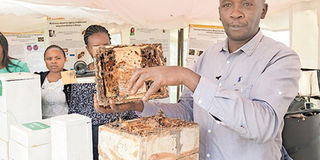You will soon be able to buy queen bees

James Ng'ang'a, a stingless bee researcher displays a hive as he explains how modern beekeeping works. With the new technology, farmers can also avoid variability in production, where many of them find one hive missing honey due to lack of a colony, while the others have so much. PHOTO | LEOPOLD OBI | NMG
What you need to know:
- Today, it takes even longer for the bees to colonise the hives in Baringo, an area that initially had plenty of the insects, thanks to desert plants such as acacia.
- The declining bee population has seen the annual honey production drop from 35,000 metric tonnes to 25,000 tonnes, leaving the country with a consumption deficit of 13,000 metric tonnes.
- With the technology, farmers can also avoid variability in production, where many of them find one hive missing honey due to lack of a colony, while the others have so much.
- Without bees, the chances of cross-pollination dim, drastically reducing food production, what is worrying agriculturalists.
Justin Kiprono, a farmer in Baringo County, ventured into bee farming sometime in 2012 by setting up hives and then waiting for the bees to colonise them.
With Baringo among the top producers of honey, the farmer knew it would take only a few weeks if not days for the bees to come.
“I had constructed a grass-thatched shade then hanged 45 hives inside, suspending them several metres above the ground,” recalls the Bogoria Special Honey proprietor.
After about six months, he was shocked to find that only a third of the hives had been occupied.
Today, it takes even longer for the bees to colonise the hives in Baringo, an area that initially had plenty of the insects, thanks to desert plants such as acacia.
“In the past, the pollinators were everywhere. The area had many indigenous trees of the acacia species, which give honey a unique taste,” explained the farmer, who currently has over 80 fully colonised beehives.
But over the years, the farmer observed that bee population rapidly declined in the area that one can install 100 beehives but only three will be colonised after six months.
“There has been rampant charcoal burning, leading to deforestation. Many people have also ventured into fruit and vegetable farming, so they tend to apply too much pesticides which is harming bees,” he noted during the celebration of the World Bee Day on Monday.
The declining bee population has seen the annual honey production drop from 35,000 metric tonnes to 25,000 tonnes, leaving the country with a consumption deficit of 13,000 metric tonnes.
Nevertheless, scientists are working to solve the scarcity of bees through new technology.
Stephen Kagio, a bee researcher at Egerton University, says they are currently working on a propagation project that will see farmers buy mature queens to start their bee farms instead of waiting for the insects to colonise their hives.
HIVES ARE NOT COLONISED
Joel Masobo, a bee researcher at the same university, said the technology involves picking 10 hours-old bee larvae, which are then taken to virgin queen bank where they are bred in compartments.
“Once they grow, they are taken to separate compartments, after which they are mated and left to lay eggs,” he offered.
He explained that the young queen bees can then be used to replace ageing ones or used in a new beehive.
“While the life expectancy of a queen bee is 4-5 years, the mother bee is mainly prolific in the first two years. So we want to encourage farmers to keep young queens for a constantly high production,” said Masobo.
With the technology, farmers can also avoid variability in production, where many of them find one hive missing honey due to lack of a colony, while the others have so much.
“Many farmers are complaining that their hives are not colonised, we need queen bee propagation technologies to boost bee farming,” Kagio remarked.
Kagio, who is also the apiculture platform chairman, said the main purpose of bee is pollination, but most of the people do not know that.
“We tell farmers to grow sunflowers and avocados, which require pollination but we are not telling them how the crops will be pollinated. This is why we must address the pollination service,” said the agriculture lecturer at Egerton University.
Without bees, the chances of cross-pollination dim, drastically reducing food production, what is worrying agriculturalists.
Scientists attribute the decline to land degradation, habitat loss and climate change, which has led to prolonged drought, forcing bees migrate to other areas.
Sheila Koech, a researcher at the International Centre for Insect Physiology and Ecology (Icipe), said they had trained several groups of farmers around Kakamega Forest, Taita Hills and Mwingi on rearing the stingless bees.
These species visit several trees and produce high quality and medicinal honey compared to the African honey bee.
“We have identified various species such as the carpenter bee, which do not produce honey, and 12 species of stingless bees which we are currently training farmers to adopt.”





